
Casablanca Chess made a strong impression on the first day of play in Morocco. The innovative format, where players begin in positions selected from historical games, brought excitement to both participants and spectators. Following three rounds and six rapid games Magnus Carlsen is leading with 2.5 points (wins against Anand and Nakamura, a draw with Amin).
Hikaru Nakamura is in second place with 1.5 points (a win against Amin, a draw with Anand, and a loss from Carlsen). Viswanathan Anand and Bassem Amin both find themselves at the bottom of the tournament table with 1 point each (two draws and one loss).

The first-round position was selected by the broadcast commentators, grandmasters Jan Gustafsson and Daniel Naroditsky. They had three options: Chigorin-Steinitz 1889, Lasker-Tarrasch 1908, and Rubtsova-Bykova 1958.
„Just for pure excitement, we have to go with number 1,“ said Gustafsson. „That’s an Evans Gambit, a 19th-century style!“ Naroditsky chimed in. This is how the players transported themselves back to 1889, revisiting a World Championship match in Havana. They began from the 11th move, a departure from Wilhelm Steinitz’s original 11. dxe5 – a move that none of our participants replicated.
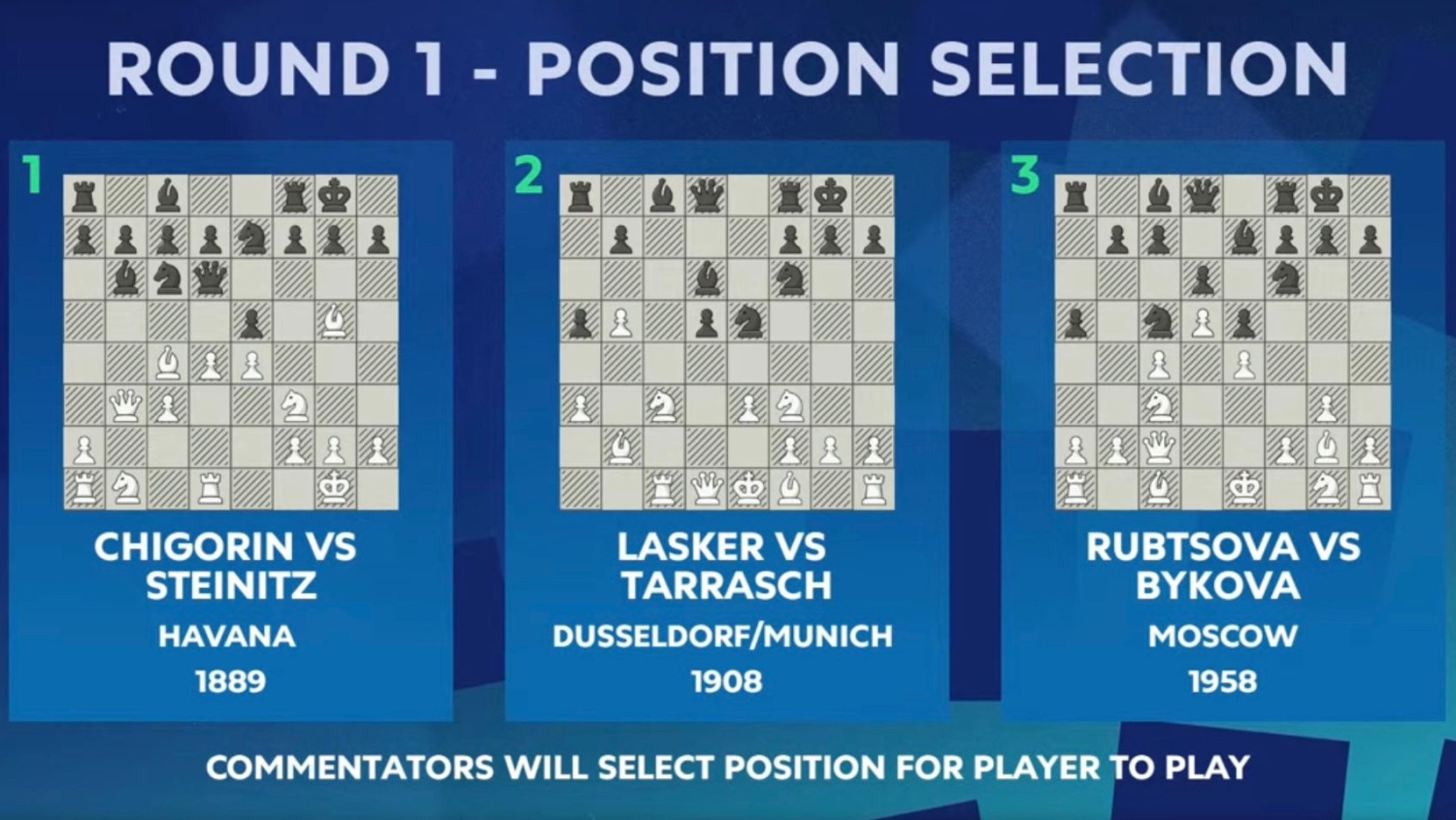
Magnus Carlsen opted for 11. Na3. A few moves later, Viswanathan Anand took a daring path with his queen, only to find it trapped shortly afterward. White secured victory in just 20 moves.
Hikaru Nakamura, with White against Bassem Amin, started with a solid 11. Bf1 but very soon sacrificed both rooks, gaining a queen in return and achieving a winning position. The American wrapped it up with a nice bishop sacrifice.
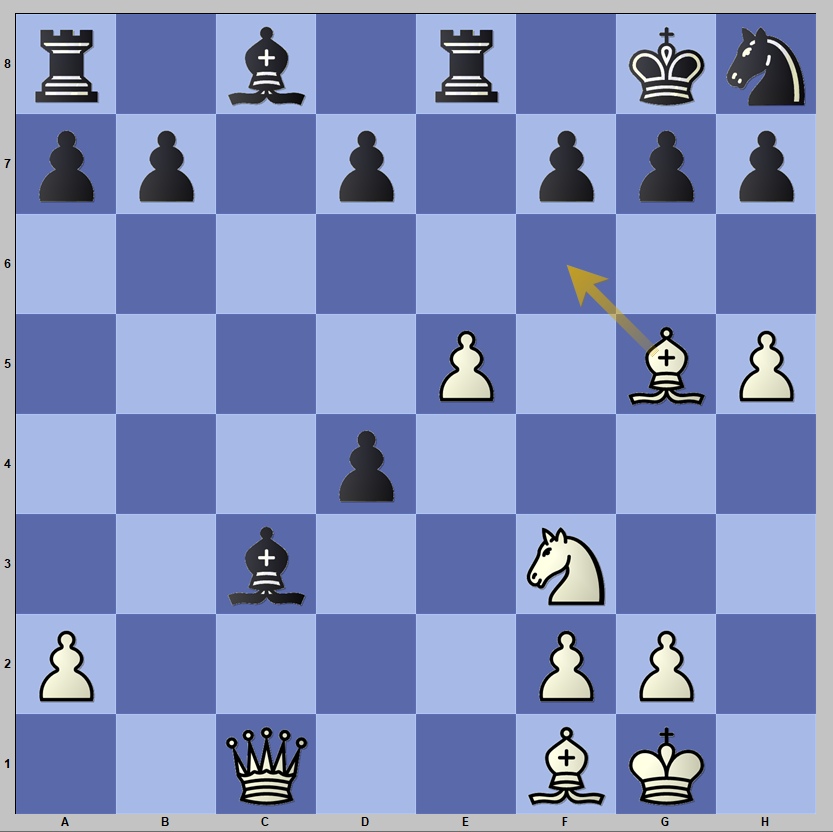
24. Bf6! h6 (24…fxf6 25. exf6 Bb4 26. Bd3) 25. Qf4 Bb4 26. Bd3 d5 27. Bxg7 Kxg7 28. Qf6+ 1-0
This game lasted a little longer, White won too, putting Carlsen and Nakamura in an early lead.
Bassem commented, „The starting position may appear equal, but as Black, you’re on the defensive side, and one wrong move can destroy everything.“
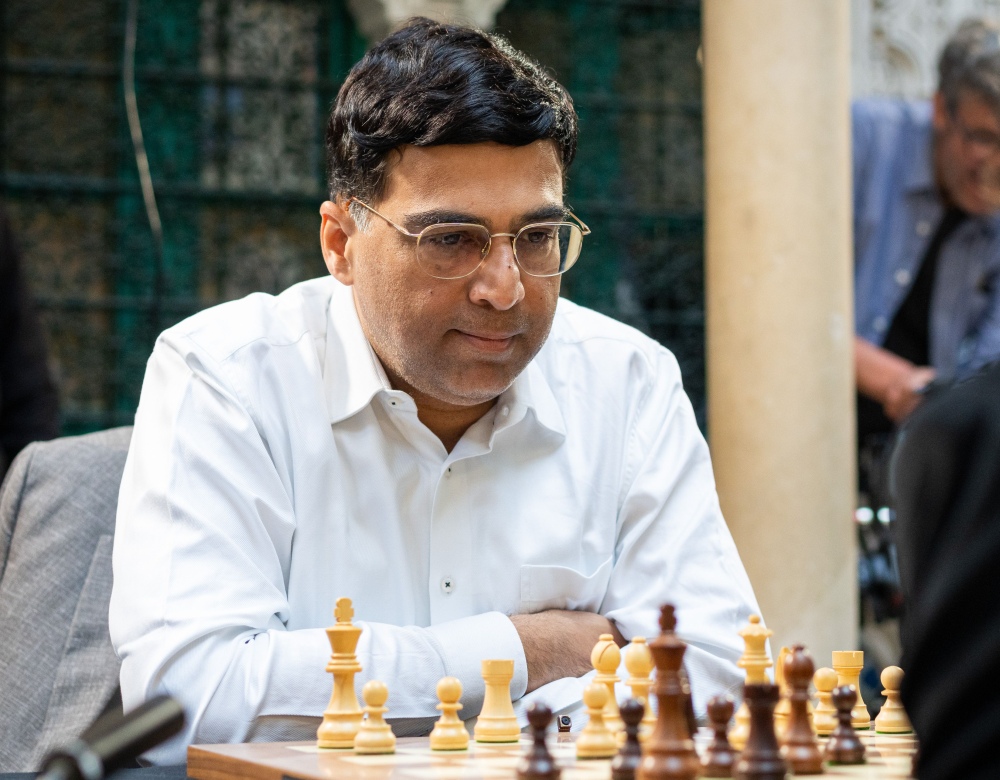
Offering his thoughts, Anand said, „I liked the idea [of the Casablanca chess variant], but I haven’t given it much thought; it just seemed like something fun. The position from the first game is challenging to grasp in rapid play. And having only two minutes before the start is very little to think of anything. It feels like being thrown into the deep end every time. Let’s see if it gets better!“
For the second round, the players themselves voted on the position. The options were Graf-Menchik 1934, Xie-Galliamova 1999, and Smyslov-Botvinnik 1957. Not knowingly, Anand, Nakamura, and Bassem all chose different ones, so it was ultimately Carlsen’s decision that sealed the deal.
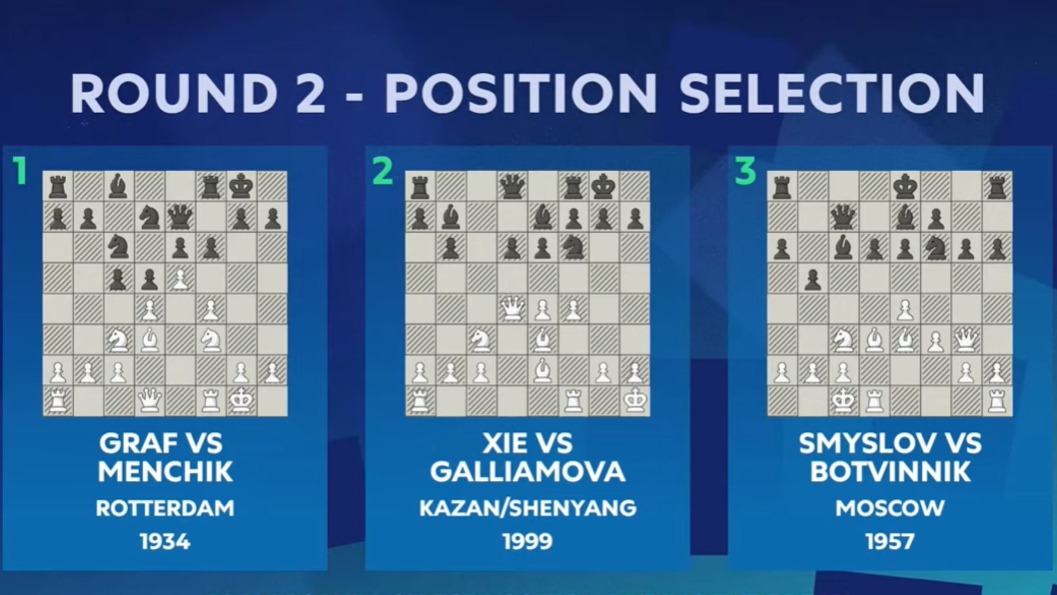
The players began their game at move 11 in Game 10 of the Xie Jun vs. Alisa Galliamova Women’s World Championship Match in Kazan/Shenyang in 1999. In the original game, Xie chose 11. Be3.
Bassem, playing White against Carlsen, followed a similar path. The players continued the game until move 19 when Carlsen deviated by playing 19… Rc8 instead of Galliamova’s 19… Re4. In the ensuing rook endgame, Carlsen managed to win a pawn, but it still resulted in an easy draw for White. The game concluded uneventfully on move 46.

Anand also selected 11. Be3, but in this game, Nakamura (playing as Black) deviated earlier. At move 15, Nakamura opted for an intermediate move, 15… Bc5, rather than 15… Bf6.The game quickly transitioned into a drawish rook endgame, and the players split the point on move 49 through a threefold repetition. Notably, players are not allowed to offer a draw at any moment during the game.
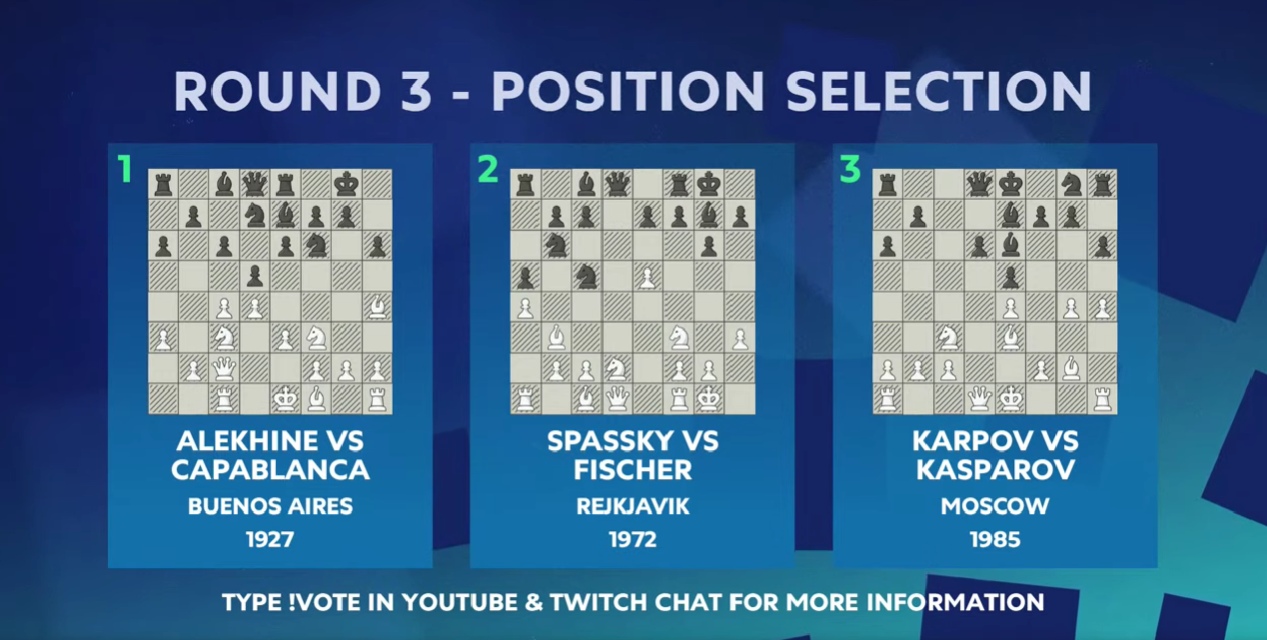
The third position was determined by a popular vote during the broadcast. The audience had to choose between three famous world championship matches: Alekhine vs. Capablanca (1927), Spassky vs. Fischer (1972), and Karpov vs. Kasparov (1985). Ultimately, they opted for the latter. Bassem vs Anand and Nakamura vs Carlsen started from move 12 in the 14th game of the 1985 Karpov-Kasparov match.
The players followed the original game with 12. Nd5 Rc8 and 13. c3. However, Anand deviated by capturing a pawn on h4 (13… Bxh4), digressing from the predecessors, and the game finished in a draw by repetition just a couple of moves later.

Carlsen, on the other hand, adhered to the original game with 13… Nf6 but then made an unorthodox move on the next turn, playing 14…Kxe7 instead of Kasparov’s 14…Qxe7.
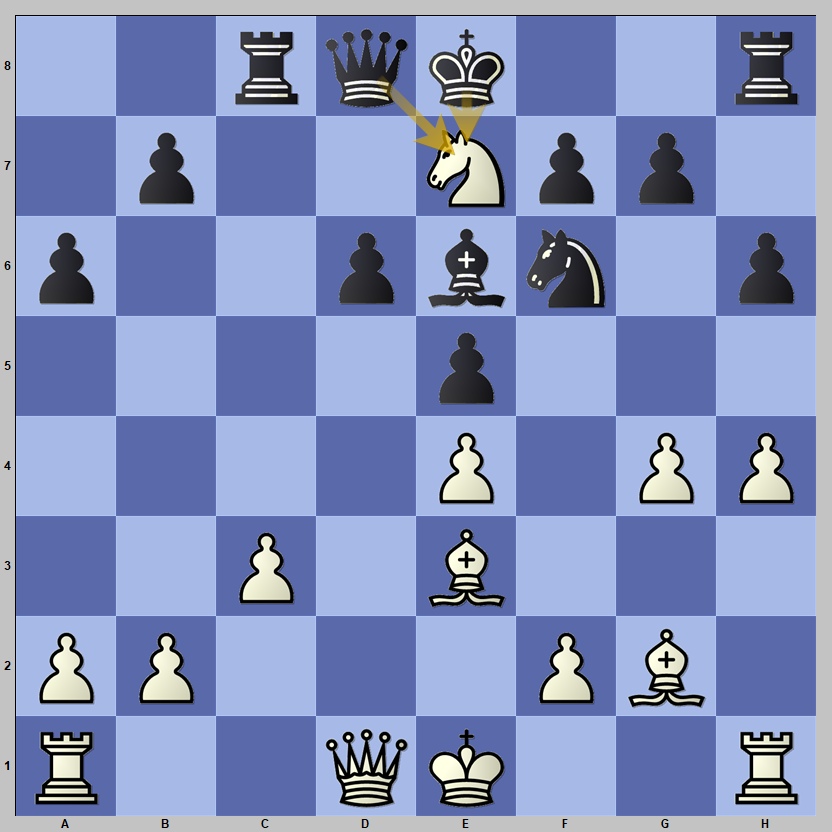
After 15. g5 Ng4 16. Bc1 hxg5 Hikaru made a serious mistake with 17. Bf3? (17. f3 Nf6 18. Bxg5 and White is fine). Magnus quickly gained an advantage with 17…Qd7! 18. Rg1 Nh2 19. Bg5+ f6 and won the game on move 35.
After the day was over, Carlsen shared his impressions: „It’s a fun format. I think what happened in the second game was a bit of a shame as it all liquidated to a draw pretty quickly.“

Answering whether he recognized any of the starting positions, Carlsen replied: „The last game looked very similar to Karpov-Kasparov games from the second match, and I seemed to remember that Garry’s knight ended up on g4 and maybe h2. But that was about it. The first game I thought it has to be a Steinitz game since he’s the only one who plays like that. Probably against Chigorin, as they had a World Championship match in 1889, and there were a lot of Evans gambits. The second one, I had no clue!“
The play will resume on Sunday, May 19, with three more rounds.
Photos (please attribute the photographer when using): Dropbox
Live Broadcast: Casablanca Chess 2024 – Chess.com
Official Website: Casablanca-Chess
Written by Anna Burtasova, Casablanca Chess Press Officer
Photos by Lennart Ootes






More Stories
100% accuracy for Ding Liren and Gukesh in their 4th game draw
Wall Street Gambit: Where chess meets finance
Gukesh strikes back to tie FIDE World Championship
Gukesh: Today was a good day!
Ding Liren takes down Gukesh in the first game of title match
Ding Liren takes down Gukesh in the first game of title match